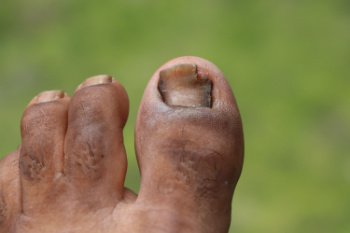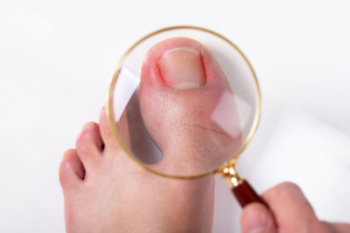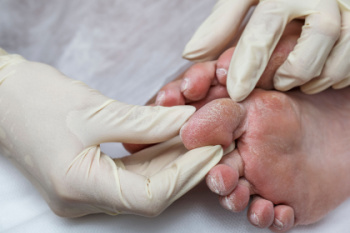Items filtered by date: June 2025
Managing and Preventing Toenail Fungus

Toenail fungus often begins as a white or yellow spot under the nail and can progress to thickening, discoloration, and crumbling, if left untreated. Fungal infections thrive in moist, enclosed environments like sweaty shoes or damp socks. To reduce risk and manage the condition, it is important to keep feet clean and dry, trim nails regularly, and wear breathable footwear. Avoid walking barefoot in public showers or pool areas, and disinfect nail tools after use. Mild antifungal creams may help in some cases, but deeper infections often require prescription medication or laser therapy. Fungal nails can be stubborn and take time to clear. Regular monitoring and consistent care are key. If the condition is not improving or spreading, it is suggested that you see a podiatrist for a diagnosis and treatment plan that targets the infection at its source.
For more information about treatment, contact one of our podiatrists of Pennsylvania. Our doctors can provide the care you need to keep you pain-free and on your feet.
Toenail Fungus Treatment
Toenail fungus is a condition that affects many people and can be especially hard to get rid of. Fortunately, there are several methods to go about treating and avoiding it.
Antifungals & Deterrence
Oral antifungal medicine has been shown to be effective in many cases. It is important to consult with a podiatrist to determine the proper regiment for you, or potentially explore other options.
Applying foot powder on the feet and shoes helps keep the feet free of moisture and sweat.
Sandals or open toed shoes – Wearing these will allow air movement and help keep feet dry. They also expose your feet to light, which fungus cannot tolerate. Socks with moisture wicking material also help as well.
If you have any questions please feel free to contact one of our offices located in Plymouth Meeting and Ambler, PA . We offer the newest diagnostic tools and technology to treat your foot and ankle needs.
Ingrown Toenail Facts

An ingrown toenail occurs when the edge of the toenail grows into the surrounding skin, causing irritation and discomfort. This condition most commonly affects the big toe and can result from improper nail trimming, wearing tight shoes, toe injuries, or inherited nail shapes. Symptoms include redness, swelling, pain along the nail edge, and sometimes infection with drainage or increased tenderness. If left untreated, an athlete's foot infection may worsen and lead to more serious complications. Diagnosis is usually made through a clinical examination of the affected toe. A podiatrist can provide relief by carefully removing the ingrown portion, treating any infection, and offering guidance on proper nail care. Ingrown toenails can cause severe pain and discomfort. If you have developed this condition, it is strongly suggested that you promptly contact a podiatrist who can offer appropriate treatment remedies.
Ingrown toenails can become painful if they are not treated properly. For more information about ingrown toenails, contact one of our podiatrists of Pennsylvania. Our doctors can provide the care you need to keep you pain-free and on your feet.
Ingrown Toenails
Ingrown toenails occur when a toenail grows sideways into the bed of the nail, causing pain, swelling, and possibly infection.
Causes
- Bacterial infections
- Improper nail cutting such as cutting it too short or not straight across
- Trauma to the toe, such as stubbing, which causes the nail to grow back irregularly
- Ill-fitting shoes that bunch the toes too close together
- Genetic predisposition
Prevention
Because ingrown toenails are not something found outside of shoe-wearing cultures, going barefoot as often as possible will decrease the likeliness of developing ingrown toenails. Wearing proper fitting shoes and using proper cutting techniques will also help decrease your risk of developing ingrown toenails.
Treatment
Ingrown toenails are a very treatable foot condition. In minor cases, soaking the affected area in salt or antibacterial soaps will not only help with the ingrown nail itself, but also help prevent any infections from occurring. In more severe cases, surgery is an option. In either case, speaking to your podiatrist about this condition will help you get a better understanding of specific treatment options that are right for you.
If you have any questions please feel free to contact one of our offices located in Plymouth Meeting and Ambler, PA . We offer the newest diagnostic and treatment technologies for all your foot and ankle needs.
Are Bunions Affecting Your Everyday Life?
The Importance of a Diabetic Foot Exam

A diabetic foot exam is a comprehensive evaluation of the feet performed to detect early signs of complications related to diabetes. This exam is essential because diabetes can lead to reduced circulation and nerve damage, increasing the risk of foot ulcers, infections, and loss of limb. Causes for needing this exam include prolonged elevated blood sugar levels, poor foot hygiene, and inappropriate footwear. Symptoms that may prompt an exam include numbness, tingling, swelling, changes in skin color, or non-healing wounds. Regular foot exams can help prevent serious complications and ensure early treatment. If you have diabetes, it is strongly suggested that you are under the care of a podiatrist who can perform routine foot evaluations and preserve mobility through proactive and personalized care.
Diabetic foot care is important in preventing foot ailments such as ulcers. If you are suffering from diabetes or have any other concerns about your feet, contact one of our podiatrists from Pennsylvania. Our doctors can provide the care you need to keep you pain-free and on your feet.
Diabetic Foot Care
Diabetes affects millions of people every year. The condition can damage blood vessels in many parts of the body, especially the feet. Because of this, taking care of your feet is essential if you have diabetes, and having a podiatrist help monitor your foot health is highly recommended.
The Importance of Caring for Your Feet
- Routinely inspect your feet for bruises or sores.
- Wear socks that fit your feet comfortably.
- Wear comfortable shoes that provide adequate support.
Patients with diabetes should have their doctor monitor their blood levels, as blood sugar levels play such a huge role in diabetic care. Monitoring these levels on a regular basis is highly advised.
It is always best to inform your healthcare professional of any concerns you may have regarding your feet, especially for diabetic patients. Early treatment and routine foot examinations are keys to maintaining proper health, especially because severe complications can arise if proper treatment is not applied.
If you have any questions please feel free to contact one of our offices located in Plymouth Meeting and Ambler, PA . We offer the newest diagnostic and treatment technologies for all your foot and ankle needs.

